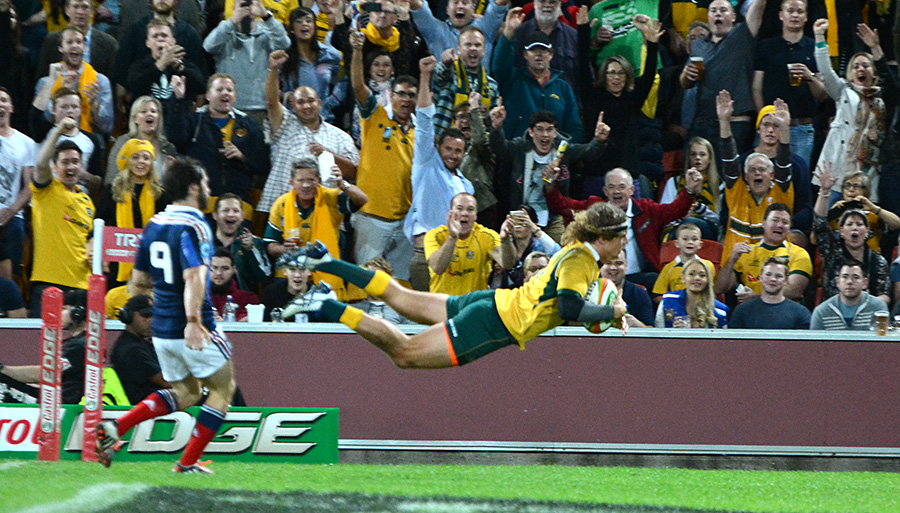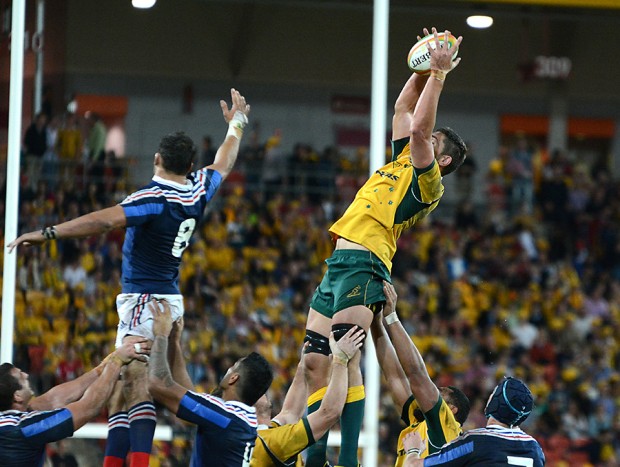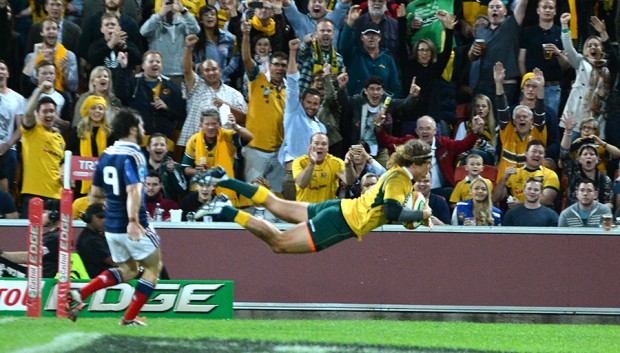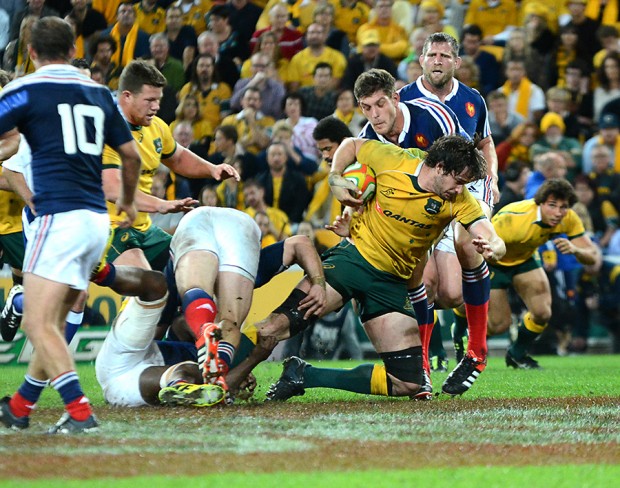Australia’s reputation in sport has been based on one significant characteristic (perhaps it’s a national one) – having a go.
This means different things to different people. For me it’s based on a belief that one should risk failure in order to achieve success – to seek to improve the detail of our performance until we can achieve greatness. It’s important that every sporting team should understand that. The performance was certainly based on having a go.
The instantaneous reaction to the opportunity to quickly move the ball in the search for space was evident throughout. This was a really important fundamental and clearly the team took it onto the field with them. A hallmark therefore of the play was a great urgency in what we did – to support, add numbers to the tackle contest, but nowhere more urgent than in our defence.
In the early part of the match the French had their moments but our scrambling defence was excellent. Scrambling defence is based on numbers and most of the time it looked like we had more players on the field than France. They made one really good break early down the left wing and at the end of a line break, support and constant pressure there were two French players and five Australians – that speaks volumes for the urgency in everything we did.
If I could single some people out, that resolute defence was symbolised by our centres. The number of times Toomua and Kuridrani were involved in Double tackles – where they would make a tackle, get up and make another straight away – was impressive.
In our search to move forward from our ‘have a go’ attitude, what we look for next is accuracy. The good parts of our game had accuracy – there was some lacking in other areas.
We did see great examples of accuracy in support and urgency in offloading. The Folau try in the 18th minute was started by a Palu offload loop to Slipper who continued the attack who then offloaded in another loop play to Folau, who had stretched the defence and made the break and scored. Urgency, desire, have a go and pretty good execution.
In the 52nd minute there was fantastic realignment, urgent passing and we almost had a try down the left wing. Again, the 55th minute, great support lines, accurate passing and Cummins scored off a switch pass from Folau. What’s really important in this situation is that the potential ball receiver stays on the outside of the ball carrier. Had Cummins come inside earlier it would have been really difficult for Folau to get him the ball because Folau would have been cut off from his right hand side by the angle of his own run.
My coaching to the supporting player in this situation has been to stay on the carrier’s outside and let him show you the way to the inside with the way he rolls his body and offers the pass. Critical is that the carrier must be able to see you on the outside so that he can turn and leave the ball in front of you as you change your angle on the inside. This is actually so easy to do because as the support player you just need to restrict your pace – let the ball carrier show you the way.
 In the 67th minute there was once again really accurate passing from Beale, a line from Kuridrani that explains everything I like about his attack – which is very reminiscent of Conrad Smith; he takes that narrow inside shoulder that straightens the attack, straightens the defence to turn inwards (and if they don’t do that you take them on the inside line) and then excellent support play by Beale resulting in his try.
In the 67th minute there was once again really accurate passing from Beale, a line from Kuridrani that explains everything I like about his attack – which is very reminiscent of Conrad Smith; he takes that narrow inside shoulder that straightens the attack, straightens the defence to turn inwards (and if they don’t do that you take them on the inside line) and then excellent support play by Beale resulting in his try.
All of that accuracy added to our attitude was first rate.
When we got into trouble it came from long passes. We scored a try from one – in the 23rd minute there was a long pass that was almost intercepted by a French centre but instead resulted in a Wallaby try. This is one of those instances where not to let outcome get confused with execution. In the 6th minute White threw a long pass into touch and late in the game Phipps threw a long pass that somehow resulted in a mystical try to the French which no one could see! Another instance of referee and TMO getting totally confused.
We can be a little more accurate in our lines of running – too often we take an outside line when an unders line would put us in a really good position to connect with runners and allow support players to come in with leg drive or take an inside offload.
So a great start. Before the game I worried we would lake grunt in the second row but as it turned out both locks offered excellent contributions all round the game – ball carries, defence, work rate. Everybody contributed and we can’t ask more than that. TPN stepped into the breach after the tragic injury to Stephen Moore, who certainly deserves better – he’ll come again. Excellent work from Michael Hooper who didn’t seem to strain one single bit having to take over the captaincy.
Slipper was terrific and Kepu did more than normal – he was at least OK.
White and Foley were great (minus those long passes). I reckon our 10-12-13 can as a combination do more for us in attack – we’ll see how that develops. They’re all threats but if they play more aggressive lines that should open up more space for the back three and more opportunity for second touches.
A great performance marred by missing out on some excellent players for the rest of the year. My word of warning will be that the French are NEVER more dangerous than when they’ve just played badly – and they certainly have.
By the way, how did Ma’a Nonu avoid a yellow card in the New Zealand versus England test? That was just a neglect of the laws of rugby. There was a second occasion when the All Blacks should have been yellow carded, then the FIRST time England infringe – a yellow! England deserved better. As normal though, that won’t get taken into account when selecting the international referee panel.





